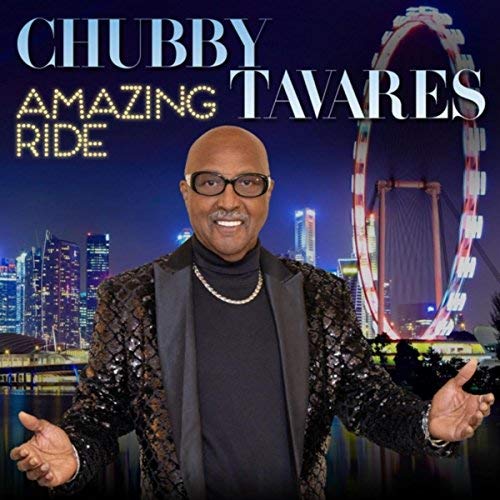Chubby Tavares
Chubby Tavares
When asked to name the Soul Music supergroups of the '70s and early '80s, folks tend to gravitate to familiar names such as Earth, Wind and Fire, theSpinners, the Commodores and the Isley Brothers. However, five brothers from New Bedford, Massachusetts - Ralph, Tiny, Chubby, Butch and Pooch Tavares - arguably created the most consistently high quality soul music of that period.
Originally called "Chubby and the Turnpikes," the Tavares brothers spent the late '60s and early '70s in their native New England covering tunes of R&B greats at various clubs, while trying to land a record deal. They finally scored a contract with Capitol Records' then-new black music division and released their first single, "Check It Out," in 1973. It soared to the top 10 on the R&B charts and became the group's first top 40 pop hit. It also became the centerpiece for the their Johnny Bristol-produced debut album, an excellent example of early '70s Soul that also featured the hit "The Sound That Lonely Makes." The Check It OutLP gave the first glimpse of tight brotherly harmonies and alternating lead vocals that would become the Tavares trademark sound.
Capitol teamed the group next with Dennis Lambert and Brian Potter, hot producers/writers who were coming off the hugely successful Keeper of the Castle album for the Four Tops. They led Tavares through two successful LPs,Hard Core Poetry and In The City, and the group's first #1 R&B hit (a cover of Hall & Oates' "She's Gone") and first top 10 pop hit ("It Only Takes A Minute"). While a number of other groups were covering similar stylistic territory at the time, the wonderfully tight harmonies and consistently solid song selection set Tavares apart.
If their first three albums set the Tavares brothers up for success, the fourth,Sky High, (produced by Motown veteran writer/producer Freddie Perren) and its international hits, "Heaven Must Be Missing An Angel" and "Don't Take Away the Music," led the group to the "A" list of popular black artists. Perren moved the group to a hotter beat-heavy sound not hinted at in Tavares' earlier releases and the timing couldn't have been better, as the disco boom was about to explode. The group teamed with Perren again for their Love Storm and Future Bound LPs in 1977 and 1978. It was at this point that Tavares hit an unexpected pivotal moment: it's cover of the Bee Gees' "More Than A Woman" was included on the Saturday Night Fever soundtrack, giving the group its greatest exposure ever (as well as its only Grammy award) but bringing with it a label that Tavares would spend years trying to shake - that of "Disco Group."
Interestingly, it was at disco's peak in 1979 that the brothers took a counter-industry turn, releasing the ballad-drenched Madam Butterfly LP. Produced by Philly veteran Bobby Martin, this disc highlighted the group's Soul foundation, especially on the hit "Never Had A Love Like This Before" and three Sam Dees' ballads (including the incredible "Let Me Heal The Bruises"). Tavares then teamed with pop producers Bobby Colomby and David Foster for Supercharged,a solid but underappreciated disc that spawned a minor hit with "Bad Times."
Unfortunately, as 1980 arrived, the music industry focused its efforts on self-contained funk bands, and traditional "producer's" soul groups such as the Spinners, the Stylistics and the Temptations were having trouble getting promotion and airplay. This industry tide change led Capitol Records to lessen its promotional focus on Tavares. The timing of this decision was ironic, as the Tavares brothers arguably found their sound as writers and arrangers in 1980 with Love Uprising, a wonderful, airy album that was perhaps their most pleasing and personal disc, but which fell flat on the charts. Their next LP, Loveline(featuring the songs of a promising young writer named Kashif), met a similar fate.
Faced with Capitol's neglect, the brothers went in search of a new label, and in 1982 found a temporary home in RCA's young black music division. They released two albums for RCA, New Directions and Words and Music, which featured the Grammy-nominated "Penny For Your Thoughts" and their final R&B hit, "Deeper In Love," but the albums were overall an artistic step down from the group's highest moments.
It was in 1979 that I first met the Tavares brothers. They were appearing in Detroit with Lou Rawls and I was covering the concert for a university newspaper. They were still at their peak of popularity, but were incredibly humble, polite and really helpful to a young music writer. Most of all, they made it clear in conversations that, as much as they loved making music, their families and their brotherly relationship came first. Ralph Tavares and I kept in touch over the next few years, during the group's frustrating final years with Capitol and their time with RCA, right through to the time of a difficult decision that Ralph made in 1983. "One day I came off the road and saw my little girl in a snowsuit. That look on her face told me, 'You can't do your best unless you're home.'" So Ralph resigned from the group in 1983 to spend more time with his wife and their two children. He become a court officer in New Bedford, a position he held until his retirement earlier this decade.
The remaining four brothers continued to tour internationally and in 1994 released Check It Out, a CD of newly recorded versions of their past hits, on Canadian label Unidisc. The album found the brothers in fine voice, but the instrumentation and production quality were low-budget. Brother Tiny later left the group and the remaining three continue to tour regularly, appearing in disco revival shows around the world with acts like Gloria Gaynor and KC and the Sunshine Band. Tiny rejoined the group in 2009.
In late 2011, Chubby Tavares began work on his first solo album, Jealousy,which was released in July 2012.
There are a few Tavares compilations currently available, the best of which are the two disc Anthology and the single disc Capitol Gold: The Best of Tavares. Also a number of their albums are available as import CDs.
In a decade that highlighted so many groups, from the last Detroit days of Motown to the arrival of hot sounds in Philadelphia and Los Angeles, the Tavares brothers proved themselves to be incredibly versatile, effectively covering all of those sounds as well as a unique sound that they introduced in Love Uprising. Their wonderful harmonies and consistently strong selection of material made every one of their albums a keeper.
By Chris Rizik
Available Music
Reviews
Video
| Video of the Month - Kinsman Dazz Band - "Wake Up" |
| Song of the Month - Darnell Kendricks - "What a Wonderful Night" |
| Listen Now! - The Fresh Soul Playlist |



